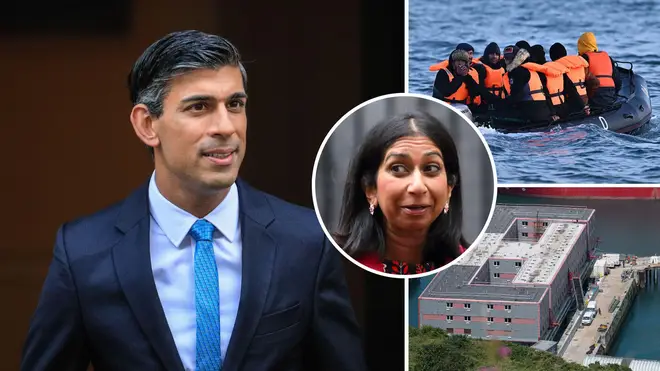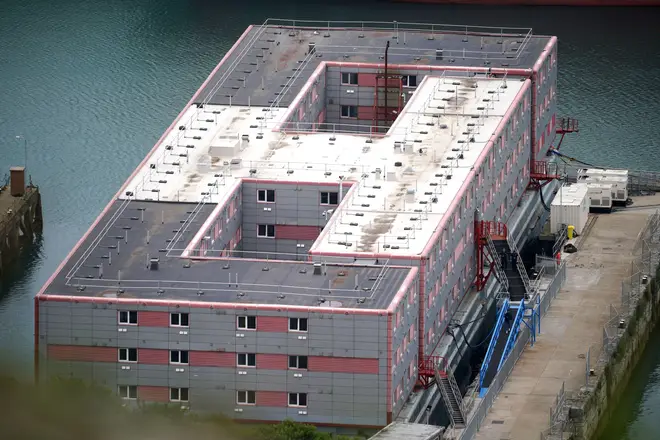
Rachel Johnson 7pm - 10pm
10 August 2023, 01:14 | Updated: 10 August 2023, 06:24

Senior Conservatives are urging Rishi Sunak to leave the European Convention on Human Rights (ECHR) at the next election if the Rwanda scheme is blocked in court.
Prime Minister Rishi Sunak could be called on to make leaving the European Convention on Human Rights a key pillar in the Tory election campaign if deportation flights to Rwanda are blocked by Strasbourg court.
Up to a third of Tories are expected to call on the Prime Minister to pull out of the ECHR membership if the plans are blocked by the treaty.
It is believed at least eight Cabinet ministers would back the calls, as well as other senior Tories, according to a Cabinet source who spoke to The Telegraph.
The ECHR is a treaty that sets out the rights and freedoms people in its 46 signatory countries are entitled to and is overseen by the European Court of Human Rights.
Last year the government’s controversial Rwanda scheme was blocked from taking off after the first flight was stopped by a European judge at the eleventh hour.
Since then the scheme has faced several legal challenges, forcing the government to suspend the plans.
Despite the scheme initially being cleared by UK courts, the UK’s Court of Appeal surprised the Home Office last month after it ruled against the scheme.
Read more: Government to send channel migrants 4,000 miles to Ascension Island as 'sensible' Rwanda alternative
Read more: Government can appeal decision on controversial Rwanda migrant plan at Supreme Court

An appeal is now set to take place at the Supreme Court this autumn to decide whether the policy is legal, although it remains to be seen whether it will be possible to overturn last month’s ruling.
The Court of Appeal ruled in July that the flights should remain blocked as the scheme poses a risk to asylum seekers’ human rights.
Government ministers have been warned that if the Supreme Court rules against the scheme again in the autumn, it cannot be appealed at the Strasbourg court, as such appeals can only be made by individuals.
Despite reports of growing pressure from senior Tories to leave the treaty, the government’s official position on the UK’s ECHR membership remains the same.
A spokesperson said: "The government has been clear that it will abide by its international treaty obligations.
"As we've set out previously - we believe our Stop the Boats Bill will deliver the changes necessary to reduce the incentives for people to risk their lives through illegal crossings while remaining party to the ECHR."
However, after the government’s Illegal Migration Act, ministers will now have the power in the future to ignore any injunctions from the court.

Despite the government’s official standpoint, immigration minister Robert Jenrick said on Wednesday: “We’ll do whatever is necessary ultimately, to defend our borders and to bring order to the asylum system.
“We will do whatever is required, take whatever action is needed. But we’re very confident that the arrangements that we’ve put in place with Rwanda are in accordance with our international law obligations.”
The ECHR was implemented in 1953 and affects the 46 states in the Council of Europe - it is a separate convention to the European Union, which is why it was unaffected by Brexit.
As it stands, Home Secretary Suella Braverman is the only Cabinet minister to have publicly backed calls to leave the ECHR.
A Cabinet minister and alleged close ally of Mr Sunak said: “The Government isn’t ruling it out. We’ve spent a very long time as a party trying to find a place that we can live with the ECHR, and we still want to – but ultimately, if you get to a point between deliverability and not, then I don’t think you can totally rule it out.”
However, some Tories have criticised any calls to leave the ECHR, as Sir Bob Neill, the Conservative chairman of the Commons Justice Committee, said it would be "a completely foolish idea and absolutely wrong”.
It comes after the government’s first housing barge welcomed its first group of 15 migrants this week, which has also faced some legal challenges.
Legal representatives for a refugee charity blocked the transfer of some 20 migrants onto the boat amid accusations the accommodation was “inhumane” for asylum seekers.